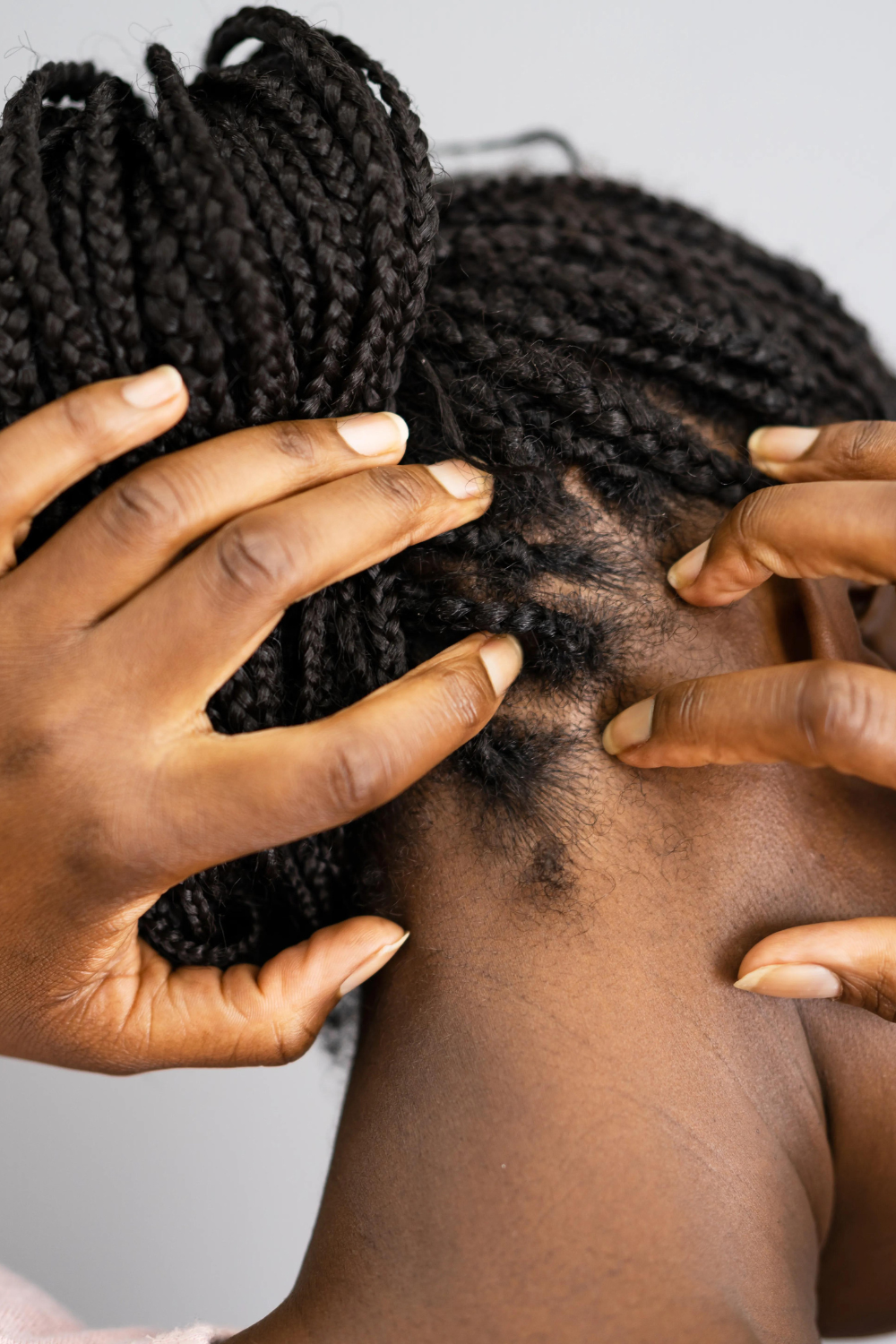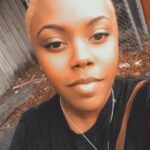Having an itchy dry scalp can drive you crazy!! What’s more embarrassing than having a dry, itchy scalp with white snowflakes on your shoulders? And I’m here to tell you that you’re not alone.
Because most of the time, our dry scalp comes from needing moisture. So if you need some hair product recommendations, scroll down to see my favorite products for dry, itchy scalp that works.
But sometimes, lack of moisture isn’t the main cause of a dry scalp. It can occur when your skin is suffering internally AND externally.
For instance, if you are in a dryer climate, it can affect the way your scalp reacts to it. And if you’re not drinking enough water, it can cause your scalp to dry out and become very itchy. But that’s not where it stops.
So, if you are wondering if you have a dry scalp, here are some symptoms to look out for when dealing with dry skin on your scalp.
In a rush? Jump to a section that sparks your interest below.
DISCLOSURE: Some of the links in this post contain affiliate links. At no additional cost to you, I may earn a commission. Read more about it in the Privacy Policy.
Dry Scalp Symptoms
- Dry, scaly patches on your scalp
- Dandruff-like flakes coming from different areas on your scalp
- Itchy scalp
- Sores on certain parts of your scalp
- The scalp has a burning feeling that is sore to the touch
8 Reasons Why Do You Have A Dry Scalp
The reason you may have a dry scalp depends on so many things.
Consider your age, your location and its climate, how often you wash your hair, hair products you use, hormones, excessive smoking, a skin condition such as psoriasis or eczema, or any medications you may take.
1. Your Age
When it comes to age, increased trans-epidermal water loss leads to dry skin and reduces our barrier functions. This means the amount of water that naturally evaporates through our skin is decreased due to us getting older.
The same applies to our scalp. The older we become, we naturally lose elasticity. This makes it harder for our scalp to hold moisture, like it used to when we were younger.
So when our scalp won’t accept external moisture from the surrounding environment, this leaves it vulnerable without any barrier functions.
This is why our moms and grandmas would still use hair greases on their scalp to create the barrier needed for their hair and scalp.
2. Your Location
Your location could affect how much moisture your scalp receives. If you live in a dry climate, your scalp may become very dry if you don’t properly moisturize your hair and scalp.
In this case, most people complain about dry, itchy scalps during the cooler seasons, such as winter and maybe spring. I live in Georgia, where the weather here is very humid. Maybe not as humid as Florida, Arizona, or Alaska, but we have our fair share of it.
When we traveled to Pennsylvania during the winter months, my skin and hair suffered from the drier climate. I had to slightly change up my hair care products to a heavier sealant to better protect my scalp. Believe it or not, Blue Magic Castor Oil helped a lot. I get it from Amazon.
3. Over Washing Your Hair
If you are shampooing your hair more than once a week every week, chances are you are overly washing your hair.
When this happens, you are constantly stripping the natural sebum from your scalp, which causes your scalp to become dry and vulnerable to any environmental elements.

Sebum is a natural oil your body produces on your scalp to protect it from environmental elements and become overly dry. If you are constantly shampooing your hair and scalp, you aren’t giving your body enough time to produce more sebum for your scalp. Without it, the scalp is unprotected, vulnerable, and becomes very dehydrated.
4. Using Harsh Hair Ingredients
Using hair products that contain harsh ingredients can make your scalp irritated and itchy. Most of the time, the ingredients used in hair products will dry out the natural sebum on your scalp. Clarifying shampoos can sometimes do this, but you can find some without all the irritating ingredients.
Normally, you can tell a difference within the first two weeks of using a new hair product. You’ll be scratching your scalp, wondering why it became so itchy out of nowhere.
If you are using hair care products with harsh ingredients, this could contribute more to your dry scalp. This is because these ingredients are so strong, they are stripping the natural oils from your scalp.
Here are some ingredients to watch out for in your shampoos and conditioners.
- Sodium Lauryl Sulfate
- Parabens
- Silicone
- Formaldehyde
- Propylene glycol
5. Hormones
Sometimes as a woman, hormone imbalance could be the cause of our dry scalp. As for myself, I can attest to this, because when I was on birth control, my scalp went from oily to dry fast.
It caused my scalp to become inflamed and very itchy. Once I got off birth control and became pregnant, my hair and scalp became worse.
This is because of the declining levels of the reproductive hormones that normally stimulate our oil glands. So when our hormone levels fall, our natural oil production falls as well, which causes our skin and scalp to become rough, dry, itchy or flaky.
6. Excessive Smoking
If you like smoking cigarettes, look in the mirror to see if you are suffering from dry skin. If so, this could also be one of the causes of your dry scalp.
Most tobacco products that contain nicotine are one of the contributors to why smoking is so addictive. That said, nicotine can decrease blood flow by causing the narrowing of our blood vessels.
Which in turn causes a dry and irritated scalp, along with other health issues. In order for you to understand how this affects your scalp, we have to understand the structure of our overall skin.

The Layers of Our Skin
Our skin has three layers: the Epidermis, which is the skin we see and feel; the Dermis, the layer below the Epidermis that houses our collagen and elastin fibers; and the Hypodermis, below the Dermis which contains our blood vessels.
We need blood to supply our blood vessels as much as possible because they help nourish our collagen and elastin fibers. When you smoke, it causes your blood vessels to become narrow and limits your blood flow.
Without a proper amount of blood flow to our scalp, this slows down our sebum production, hair growth, and the elasticity of our scalp.
7. Psoriasis and Eczema Can Cause Dry Scalp
If you have psoriasis or eczema, you may notice some of the dry symptoms signs on your scalp. Psoriasis is when you have dry, rough patches of white scaly skin that can flake when you make contact with it.
Most patches are thick and raised from other parts of your skin. Some people report that those dry patches are itchy and are hard not to scratch.
Most of the time, your doctor will prescribe you certain skincare products and medications to take to help aid with your psoriasis.
Eczema is another skin condition that will cause dry skin. Unlike psoriasis, Eczema can appear in small patches of tiny bumps that are flesh-toned, pink, or red.
On lighter skin, it could be pinkish to red. On darker skin, it could appear gray or purple.
Both can also appear on your scalp. I’ve had clients who had psoriasis on their scalp, and I mistakenly diagnosed it as dandruff. Though they can appear similar, dandruff produces oily-like flakes. Whereas psoriasis and eczema are dry flakes.
8. Your Medications
Certain medications can cause dryness in your scalp. The side effects of medications can be temporary or long-term. Some medicines for blood pressure, birth control, heart conditions, acne treatments, allergies, liver, etc… just to name a few.
When in doubt, pay closer attention to your body when starting new medicines. Make sure to never skip out on your moisturizers when doing your daily hair care routine.
After wash day, how soon does your scalp start to itch?
Shampoos For Itchy Scalp

Peppermint & Aloe Anti-Itch Shampoo
The Design Essentials Peppermint and Aloe Anti-Itch Shampoo is great for mild to severe itchy scalps. It relieves the scalp of overly dry and itchy ness with Pyrithione Zinc to control flaking.

Nizoral Anti-Dandruff Shampoo
When you have an excessive itchy scalp that creates crazy flakes on your head and shoulders, you need the Nizoral Anti-Dandruff Shampoo. It’s made with Ketoconazole 1%, which is the only over-the-counter dandruff shampoo to powerfully fight dandruff and scalp fungus.
I hope this helps you, my love.
– Much Love, Ash ❤️








Leave a Reply